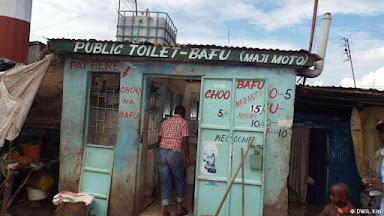Periods should not defy a girl's dignity
A Ugandan study found that nearly two-third of schoolgirls in rural areas miss school at least once a month owing to menstruation.
This statistic is simply shocking. Writing this blog as a woman, I know first-hand the difficulty of menstruation, especially for young girls. The privilege of accessing menstruation products, support and the simple opportunity to talk about it with other people is something that I may have taken for granted. For many girls, in particularly in Sub-Saharan Africa period poverty is an overwhelming issue for girls and women. Menstruation is natural process that all girls go through, yet it continues to burden the life of girls and women, impeding their development. This blog will explore the idea of period poverty- why it occurs and how this affects woman's lives.
 |
| Girls holding sanitary pads |
Stigmatisation of periods
Menstruation is masked in ignorance and shame in many parts of the world, and in parts of Africa. Despite being a healthy natural part of puberty and womanhood, menstruation is often a very hushed topic, full of embarrassment and stigma attached to it. Menstruation taboos reinforce gender-based discrimination and exclude women and girls from community activities, ceremonies, school, and workplaces, further perpetuating the extremely damaging idea of 'uncleanliness'. Menstruation can also be perceived as sign that a girl is ready for marriage increasing risk of adolescent pregnancy, child marriage, sexual exploitation and sex-related health issues, thus consigning women to an even more subordinate position to men and putting their health at risk. This stigma is detrimental to the wellbeing, mental and physical health of women.
Period Poverty
Effective menstruation hygiene is dependent on access to clean water, sanitation products of choice and having safe and clean spaces for using these. Education, wealth, and infrastructural limitations of sanitation and water are key contributors of these inequalities. Period poverty is therefore the lack of affordable and accessible sanitary products, resulting in girls and women remaining at home, away from school or work. Absenteeism is largely due to lack of safe, comprehensive facilities in schools, lack of awareness, embarrassment, inability to afford products and menstrual pain.
ZanaAfrica
ZanaAfrica was founded in 2007 by Megan Mukuria, who whilst working with Kenyan children found that 65% of girls could not access sanitary pads. The foundation provides girls in Kenya with comprehensive health education based on menstruation and sexual health, delivers pads and sanitary products as well as aiding in policy and advocacy. Educating girls on their own bodies, uses of products and their disposal can make a world of difference. The foundation stresses that without appropriate support
“adolescence can mean the end of a girl’s potentional”.
This statement, I believe, is a representation of how important and imperative it is to include menstruation in discussions of development. Development for women is about empowerment and provision of choice. Menstruation is not a choice, but equitable provisions to deal with it are necessary for their empowerment. Respect, dignity and awareness are crucial to tackle this intersectional issue.


Hi Wiktoria, great post! I definitely agree that the taboo of menstruation needs to be discarded in order to improve period poverty, and open dialogues that include men would be useful in this situation. To add on, I think this also points to the importance of female representation in decision-making positions to facilitate and open these discussions on sexual health and access to menstruation products. :)
ReplyDeleteHi Joanne! Thank you for you comment :) Female representation in decision making is extremely important to tackle these issues. Battling taboos and expanding opportunities for women and girls to feel safe using and talking about menstruation can be a big step into normalising girls lives.
DeleteHi Wiktoria, this was a very informative and engaging post! You articulated the issues around periods very well, especially how stigma and taboos can be hindering initiatives around menstruation and development. I like your point about how it is also necessary to educate men around these topics, something easily overlooked in development initiatives!
ReplyDeleteHi Greta! Thank you so much for you comment, I really appreciate your feedback. I also believe education of men can really impact the participation of women in decision making in development.
Delete